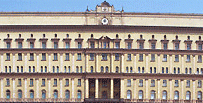Physicist Convicted of Espionage Gets Parole

(Moscow Times – themoscowtimes.com – Natalya Krainova – November 14, 2012)
Valentin Danilov, a Siberian physicist jailed on charges of espionage and treason amid a spying frenzy that swept the country in President Vladimir Putin’s first term, was granted parole Tuesday and could be freed next week.
Human rights campaigners praised the ruling, saying Danilov should never have been imprisoned in the first place, but a law enforcement expert said the physicist’s release likely did not signal any kind of shift by the Kremlin. A Krasnoyarsk court, backed by local prosecutors, ruled that Danilov could be freed on parole after serving 11 years of a 13-year sentence on charges of selling sensitive information about space technology to China.
“This does not mean that Danilov will be released immediately,” the court’s press service told Interfax on Tuesday. “If the court ruling is not appealed, it will become effective in 10 days and the scientist will be released.”
That means Danilov could walk free as soon as Nov. 22.
The local FSB office in Krasnoyarsk opened the case against Danilov, who headed the Thermo-Physics Center at Krasnoyarsk State Technical University at the time of his arrest, in May 2000. The physicist was arrested in February 2001.
A jury acquitted Danilov of all charges in December 2003, but a new jury convicted him during a second trial on the same charges in November 2004 and sentenced him to 14 years in prison. The sentence was later reduced by one year.
Veteran human rights leader Lyudmila Alexeyeva said Tuesday’s court ruling granting Danilov parole was “great news.”
“Danilov is a man of great honor and a talented scientist who did not deserve to spend a single day in prison,” she told Interfax.
She said the information Danilov was accused of selling to China was available in “textbooks for [university] students.”
Alexeyeva, a co-founder of the Public Committee to Protect Scientists, created to defend scientists targeted in the spy mania of the first half of the 2000s, said she had known Danilov for a long time, calling him a patriot. She told Izvestia that the hardest thing in prison for Danilov was that he couldn’t do research.
Given a lack of domestic demand for their research and typically low wages, Russian scientists often have no choice but to work under contracts with foreigners.
Head of the Kremlin human rights council Mikhail Fedotov said Danilov was not a political prisoner but a “person who suffered from the shortcomings of our legal system.”
“Evidence of his guilt was rather doubtful,” Fedotov told Interfax, saying that his council has repeatedly spoken in favor of pardoning him.
The ruling on Danilov, who was convicted of spying for China, comes ahead of Defense Minister Sergei Shoigu’s planned visit next week to the East Asian state. Shoigu will attend the 17th Russian-Chinese intergovernmental commission on military and technological cooperation in Beijing on Nov. 20 and Nov. 21.
Andrei Soldatov, an intelligence analyst at Agentura.ru, said he did not see any kind of “signal” from authorities in Danilov’s parole, noting that he could have been released much earlier if authorities had wanted to signal something.
But Soldatov said Danilov’s parole could be an attempt to appease human rights defenders ahead of the signing of a controversial bill broadening the definition of treason.
Late last month, the Federation Council passed amendments to the law on treason that could make it possible for law enforcement officials to target people collaborating with international organizations.
On Monday, Putin told his human rights council that he was “eager” to review the bill to avoid a broad interpretation of treason, Interfax reported.
In June, authorities showed leniency toward a scientist convicted of selling sensitive technologies to China, academic Igor Reshetin, freeing him just a few months after opposition activists appealed to the presidential human rights council on his behalf. Judges sentenced Reshetin to more than 11 years in prison in 2007, although his sentence was subsequently reduced to seven years.
But several days after Reshetin’s release, a St. Petersburg court convicted two local scientists, Svyatoslav Bobyshev and Yevgeny Afanasyev, of treason and sentenced them to 12 and 12 1/2 years in jail respectively.
Since 2002, about 25 Russian citizens have been convicted of treason by Russian courts. While the majority of those convicted were military or security service officers charged with passing secrets to foreign states, some of them were researchers, including Igor Sutyagin in 2004, Oskar Kaibyshev in 2005 and the brothers Oleg and Igor Minin in 2007, all of whom have maintained that they based their research on open, declassified data.
